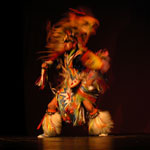
Indigenous performance-the fiestas, masked dances, processions, building altars with offerings to the departed-continues to make itself felt throughout much of Latin America, especially of course those countries with strong Native populations: Mexico, Peru, Bolivia, Guatemala, Brazil to name only the most populous. Innumerable communities throughout the Americas have kept alive their fiestas, and practitioners continue to employ performance genres (such as pastorelas-shepherd's plays-- and moros y cristianos) developed during the sixteenth century. Plazas, atrios (churchyards) and theatres are full of Moctezumas, Atahualpas, Malinches, Tepoztecatls, Quiché warriors, Yaqui deer dancers and other famous indigenous ancestors who help contemporary subjects negotiate their present. Many of these so-called folk performances continue to be presented in the same public spaces, atrios, plazas, and other places associated with ancient stagings. They emphasize participation over spectatorship, debt-payment to the gods rather than entertainment for audiences. The Latin American dramatists who have also found reasons to re-activate Amerindian scenarios of conquest and resistance throughout the centuries are too numerous to list. Astrid Hadad, Jesusa Rodríguez, Tanya Bruguera, Teresa Ralli, and Sabina Berman are some of the artists who have turned to indigenous themes and characters throughout their work. And FOMMA, the Mayan women's performance and theatre center in San Cristobal de las Casas, Chiapas, is made up exclusively of Mayan women who write and perform theatre. Co-founder, Petrona de la Cruz Cruz won Mexico's prestigious Premio Chiapas Rosario Castellano's award (1992). Isabel Juárez Espinosa, the other co-founder, has won awards for her publications.


Discussion of "Indigenous Performance"
Add your voice to this discussion.
Checking your signed in status ...